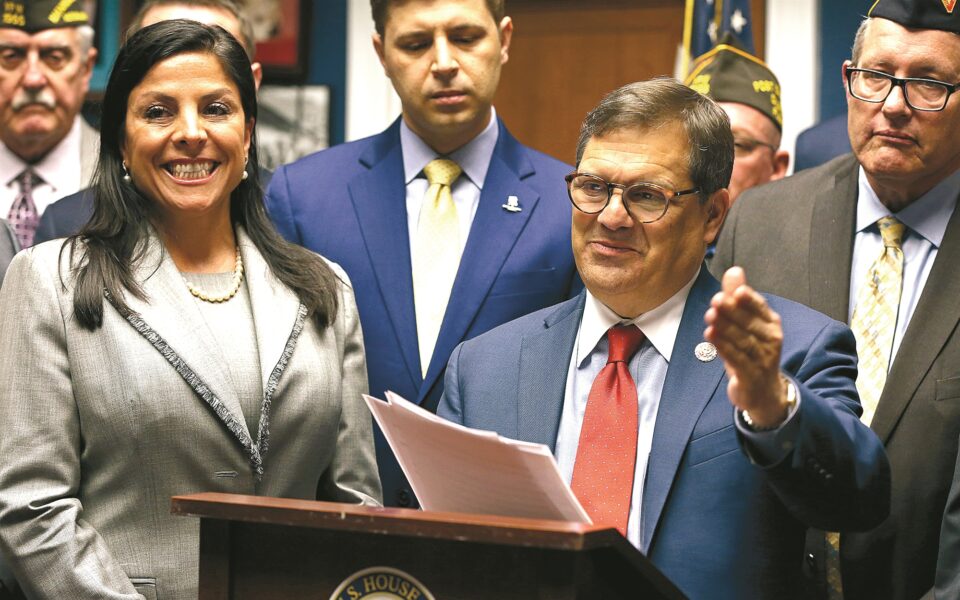The dream and the story behind the F-16 jets
US Congressman talks to Kathimerini about controversial vote on sale of F-16 jets to Turkey

Greek-American Congressman Gus Bilirakis went to bed on the evening of July 13 not knowing that the next morning, an amendment on an issue that was of particular concern to him – the sale by the United States to Turkey of 40 American-made F-16 fighter jets and 80 upgrade kits for aircraft it already owns – was to be voted on by Congress. Although he doesn’t usually put much stock in dreams, what he saw that night affected him greatly.
“I saw my parents and myself as a young boy in the ‘Greek village’ of Tampa, Florida, where I grew up. I was sobbing, telling them I wasn’t going to let it happen: I would not let the Turks take our islands.” He remembers waking up feeling anxious from the nightmare. When he found that the singer Valantis, a beloved cousin, had also sent him a message in the middle of the night, he was startled by the coincidence. “Hey, how are you? I’m going to Kastellorizo to perform and I’ll raise the flag for you too,” read his cousin’s message, in Greek.
No more than 10 minutes after, his phone rang. What he learned left him speechless: Congress was about to vote on the crucial F-16 amendment in just two hours. Neither the dream nor the message appeared like such a coincidence after all. He was on a special mission: “I left for Congress determined to leave nothing to fate,” he tells Kathimerini. Seven hours later, at 1905 GMT, he sent a message to his cousin: “We won! The amendment was approved. We will block the purchase of F-16s for Turkey!!!” Three months after, we met Gus Bilirakis in his congressional office where he told us the story behind this much-debated issue.
For Bilirakis himself, his roots in the southeastern Aegean island of Kalymnos and his love for anything Greek certainly played a part in how he pursued the issue from the very first
Turkey’s aspirations to buy the F-16s was leaked in October last year, and Bilirakis, along with 40 other fellow members of Congress, immediately sent a letter to Secretary of State Antony Blinken expressing their staunch objections. Turkey, they wrote, had already been excluded from the F-35 program because it had bought Russian weapons systems and was coming back with a request that could be dangerous. “Do not attempt to resort to legal tricks in order to overcome the sanctions obstacle. We will not hesitate to take additional legislative action to prevent such a development,” they warned.
For Bilirakis himself, his roots in the southeastern Aegean island of Kalymnos and his love for anything Greek certainly played a part in how he pursued the issue from the very first, but he was now seeing other colleagues, not only of Greek origin, distancing themselves from Turkey. The Turkish lobby, though weakened, was, of course, pushing to override those early objections. This was one of the reasons why Bilirakis was among those who worked so diligently to make Kyriakos Mitsotakis’ speech to Congress happen. And even though he had Covid that day, he watched, from afar, what the prime minister said and believes that that speech (which is framed in his office in Congress) also played an important role in the F-16 debate.
The Greek prime minister had at the time referred to the issue indirectly, asking US lawmakers to consider “the risk of instability in NATO’s southeastern wing” when making any decisions about supplying military equipment to countries in the region. The Turkish side publicly expressed its strong discontent over that statement and it appears that behind the scenes Turkey was using every remaining weapon: one of them was its veto on Finland and Sweden’s NATO accession. That’s why Bilirakis became worried when President Joe Biden said he was in favor of selling the F-16s in June in Madrid.
On July 14 everyone knew that a crucial battle would be fought in Congress. As soon as Bilirakis received the call informing him that the amendment would be debated within two hours, he got to work. As he made his way to Congress, his team sent all the Republican lawmakers an email outlining his views on the issue.
Two amendments were filed (by Congressmen Chris Pappas and Frank Palone) to improve the chances of at least one of them being adopted. In the end, the two amendments were merged, but it was announced that they would not even be advanced due to a procedural issue. Pappas was absent due to coronavirus, so Bilirakis, representing his party, talked to Palone from the Democrats and when they ensured that the amendment was going to be brought up for consideration he bluntly asked him how many Republican votes were needed for it to be advanced. “Twenty,” answered Palone. “Got it,” said Bilirakis. He had 15 minutes before the vote closed. He asked Nicole Malliotakis (also a Republican) to talk to as many of “their own” as she could and then went straight to Steve Scalise, the head of their whip, who intended to vote no. “I don’t have time to explain all the reasons, but do it for me, do it for Greece,” he said. The man immediately changed his vote, and it was that one deciding vote that caused at least 20 Republicans to change theirs as well. The amendment was advanced 244-179, blocking the sale unless measures were taken to ensure that these F-16s “will not be used by Turkey for repeated unauthorized territorial overflights over Greece.”
By another coincidence, on that day, and precisely during the vote, Bilirakis had a scheduled appointment with Greece’s ambassador to the US, Alexandra Papadopoulou, and Greek Armed Forces chief Konstantinos Floros. As soon as the amendment was advanced Bilirakis ran to his office: “We raised the flag for Greece in Washington,” he told them excitedly.
It was a very important step, but Bilirakis knew he still had a long way to go before the amendment became law. And of course, he knew that Turkish President Recep Tayyip Erdogan was not going to give up. Indeed, the Turkish side was claiming that it now had senators and congressmen on its side. At the same time, however, it did not hesitate to issue threats – putting back on the table the possibility of a veto on the accession of the two Scandinavian countries into NATO and saying that other countries could meet its needs for fighter aircraft.
‘Erdogan bullying’
The White House, which does not want to have its hands tied on this issue, was also making backroom maneuvers.
“Obviously in Greece we have to be careful about Turkey’s threats, but Erdogan is bullying Washington as well. We are tired of this kind of tactic,” Bilirakis said.
Last week, however, there was a new development that Greece’s allies did not expect. Two new amendments that were filed in the Senate – by Bob Menendez and Chris Van Hollen – failed to be advanced. The first was identical to the one of July and the second imposed additional conditions (in response to the latest Turkish threats, it demanded that Ankara ratify the protocol of Sweden and Finland’s accession to NATO and agree not to use the fighters against Syrian Kurds). Kathimerini understands that this development is due to both procedural reasons (only the amendments with majority consensus were included) and certainly also to backroom maneuverings by the White House, which does not want to have its hands tied on this issue.
Now, the two chambers (House and Senate) will have to negotiate the final defense budget bill, and the July amendment that Bilirakis helped get advanced will be debated again then. Both he and other Greek-American MPs, the Greek Embassy and the Greek-American community will step up lobbying.
“It will not be easy, but the game is not over,” he tells Kathimerini.





